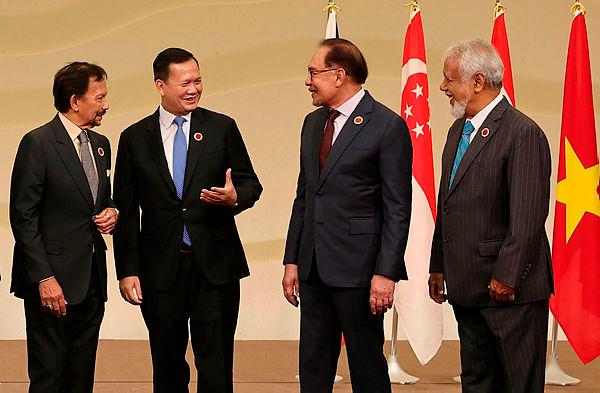TOKYO: ASEAN and Japan can collectively play a significant role within the global community towards achieving a peaceful and durable solution to the Palestine-Israel conflict, says Malaysian Prime Minister Datuk Seri Anwar Ibrahim.
He noted that all ASEAN Member States and Japan had voted in favour of the United Nations General Assembly resolution on Dec 12, which demanded a humanitarian ceasefire as well as ensuring humanitarian access and the release of hostages.
“Moving ahead, we should work together towards having these demands realised,” he said of the destruction caused in Gaza by Israel, drawing parallels with the atomic bombs dropped in Hiroshima and Nagasaki during World War II.
Anwar said this in his remarks in the first agenda themed ‘Review of ASEAN-Japan Relations’ and the second agenda themed ‘Partners for Peace and Stability & Regional and International Issues’ during the ASEAN-Japan Commemorative Summit here today.
Several ASEAN leaders, including Thai Prime Minister Srettha Thavisin and Vietnamese Prime Minister Pham Minh Chinh, in their address during the agenda also voiced their concern over Gaza and the need for an immediate ceasefire.
Meanwhile, Anwar also said that given the ongoing global polycrisis and growing complexity in the 10-member grouping’s strategic environment, the role of the ASEAN-Japan partnership in navigating these challenges is more crucial than ever.
The close cooperation and many initiatives implemented through the ASEAN Outlook on the Indo-Pacific and Japan’s Free and Open Indo-Pacific reflect the strong commitment of both sides to deepen relations and maintain peace and stability in the region.
He said that while ASEAN worked to ensure the region remains peaceful and stable, it cannot ignore the security threats from other parts of the world.
The world has been witnessing the marginalisation of the United Nations system and disregard of international law and international humanitarian law.
“We must not allow this to continue. It is important that ASEAN and Japan work together, as well as with like-minded countries, to strengthen multilateralism and uphold the rules-based international order.
“The impact of a breakdown in this world order on us all is too terrifying to contemplate,” he said.
Anwar also touched on nuclear weapons, which Malaysia views as detrimental to mankind.
“Malaysia strongly believes that the prolonged existence of nuclear weapons poses the risks of their use, either deliberately or by accident,” he said.
In the context of the region, the Southeast Asia Nuclear Weapon-Free Zone Treaty serves as the disarmament and non-proliferation instrument in the ASEAN region, which is in line with Article VII of the NPT (Non-Proliferation Treaty).
In noting Japan’s Hiroshima Action Plan, he said Malaysia believes that ASEAN and Japan can explore cooperation in disarmament, non-proliferation and peaceful use of nuclear energy in the global context.
During the agenda, several ASEAN member states also voiced their concern over Myanmar, with Srettha saying Thailand is doing its level best to help in the humanitarian crises at its borders with Myanmar and working for a solution within the Five-Point Consensus framework.
This summit serves as the culmination of commemorative activities in 2023, celebrating the 50th Year of ASEAN-Japan Friendship and Cooperation. The commemorative events began with symposiums in Jakarta, Indonesia, in February and in Tokyo in March.
Throughout the year, both the private and public sectors on both sides have organised numerous events and projects to mark the 50th anniversary. These included the ASEAN-Japan Business Week in June, the ASEAN-Japan Special Meeting of Justice Ministers in July and the ASEAN-Japan Tourism Ministers’ Special Dialogue in October.–Bernama









